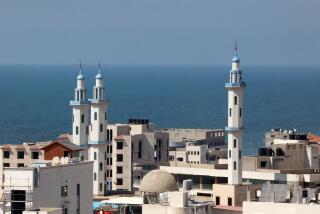THE GOODS : Notes on a War Beyond Comprehension
If you ever need evidence that information does not equate understanding, do a search on “Bosnia” on the Internet’s World Wide Web. You’ll come up with scores of sites, hundreds of pages of information and enough links to keep you busy for weeks to come.
But the volumes of information do little to truly explain how that corner of the world got into such a mess in the first place.
The information can go only so far in explaining the conflict, given its confusing historical context, the depth of the hate of those involved, the massive amounts of propaganda coming from the area and the unimaginable suffering by many whose only crime was that they were living in a particular area.
Just as Vietnam was the first television war, Bosnia is the first of the Internet Age and in a way reflects it--sprawling, churning with divisiveness, information-laden and yet largely unfathomable.
But if you take the admirable position that one should at least attempt to grasp the issues involved and keep current on what is going on in Bosnia and nearby states, here is a guide to some of the sites you can check out on the World Wide Web.
For starters, there are several sites on the Web where you can find historical information, but perhaps the best is https://www.acs.supernet.net/manu/briefhis.htm, where there is an essay by Andras Riedlmayer of Harvard University. His “A Brief History of Bosnia-Herzegovina” is not, like the most Web-friendly documents, interactive in any way. It’s just plain old text--about eight single-spaced pages worth.
But if you want a bit more than the thumbnail sketch of history offered on some other sites, this is the place to go (another essay by Riedlmayer on the “Destruction of Libraries in Bosnia-Herzegovina” is at https://www.cua.edu/www/mesabul/bosnia.htm).
Another good text essay is the “Sarajevo Survival Guide,” Miroslav Prstojevic’s firsthand account of daily life two years ago in the besieged city, offered in a straight-forward, descriptive manner tinged with humor.
“Basements and staircases are special territories,” he writes, because those places provide a bit of shelter during attacks. “In the beginning of the war, a new social category emerged: owners of staircases. They established office hours. . . .”
His piece is at https://mac-absynt-1.Informatik....Idenburg.DE/Pages/War/Survival/.
To get the official U.S. view of American troops’ involvement in peace efforts, you can call up the Pentagon’s “BosniaLINK” at https://www.dtic.dla.mil/bosnia/index.html. There you can find maps, news updates, photos and biographies of the brass.
A California-designed site that is rich in links to places throughout the Web is the “Bosnia Homepage,” maintained by students at Caltech. It can be reached at https://www.cco.caltech.edu/bosnia/bosnia.html.
And if you want to contribute to a campaign that aids women, some of whom spent time in “rape camps” in the war area, you can access “Women for Women in Bosnia” at https://www.embassy.org/wwbosnia.html.
Finally, if you don’t have direct access to the Internet but do subscribe to America Online, that service provides an often-updated area that provides news and even weather forecasts about Bosnia. The area can be accessed with the keyword “Bosnia.”
* Cyburbia’s e-mail address is David.Colker@latimes.com.
More to Read
Sign up for Essential California
The most important California stories and recommendations in your inbox every morning.
You may occasionally receive promotional content from the Los Angeles Times.











